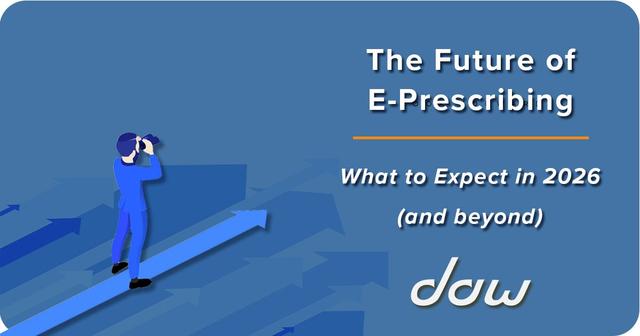E-prescribing has quickly become a standard part of modern healthcare—but where is it headed next?
As technology accelerates and regulatory requirements tighten, e-prescribing platforms are evolving to meet new demands. For healthcare providers, staying ahead means more than checking boxes—it means choosing tools that grow with your practice and your patients.
Here’s a look at what’s coming in the next wave of e-prescribing innovation, and how to prepare for it.
Greater Interoperability Across Healthcare Systems
In 2026 and beyond, the walls between systems will continue to come down.
Government initiatives like the 21st Century Cures Act have already paved the way for data sharing and open APIs. This momentum is pushing e-prescribing platforms to:
- Sync more easily with EHRs and pharmacy systems
- Support seamless transitions of care
- Enable more accurate medication reconciliation
The goal? Fewer silos, more coordinated care.
Smarter Clinical Decision Support (CDS)
CDS isn’t new—but it’s about to get a major upgrade.
Next-generation tools will:
- Tailor alerts based on patient context to reduce alert fatigue
- Use AI to predict risks and suggest safer alternatives
- Incorporate historical adherence, labs, and outcomes into prescribing logic
The future of CDS is proactive, not just reactive—helping prescribers avoid problems before they occur.
Real-Time Benefit Tools Become a Standard
Cost is one of the biggest barriers to medication adherence.
That’s why Real-Time Prescription Benefit (RTPB) tools are growing in sophistication—and importance:
- Get patient-specific pricing at the point of care
- Suggest lower-cost alternatives based on plan coverage
- Prevent downstream pharmacy rejections or surprises at checkout
By 2026, expect RTPB to be a standard feature, not a premium one.
Cloud-Based e-Prescribing Takes Over
The shift to cloud-native software isn’t just a trend—it’s a necessity.
Cloud-based platforms offer:
- Faster setup (no hardware or local installs)
- Easy updates with no downtime
- Anywhere-access for hybrid and mobile workflows
- Lower total cost of ownership for small practices
On-prem systems are becoming the exception, not the rule.
Tighter Compliance and Security Standards
As prescribing technology grows more powerful, so do the risks.
Increased attention is being paid to:
- EPCS (Electronic Prescriptions for Controlled Substances) requirements
- Identity verification and dual-factor authentication
- HIPAA compliance for cloud and mobile access
- Potential use of blockchain for immutable audit trails
Platforms that bake in security from the ground up—like ScriptSure—will give providers peace of mind and future-proof compliance.
A More Consumer-Centric Prescribing Experience
Patients now expect the same ease from healthcare as they do from other digital experiences.
That means:
- More transparency around medication options and costs
- Support for pharmacy choice and online order fulfillment
- Integration with patient portals and digital follow-ups
- Tools that help explain instructions and track adherence
E-prescribing platforms are becoming patient engagement platforms—bridging the gap between prescription and outcome.
The Future Is Already Taking Shape
E-prescribing is no longer just about legibility or compliance—it’s about data-driven care, cost control, and real-time insight.
- Healthcare organizations that invest in future-ready tools today will be better equipped to:
- Adapt to new policies
- Improve patient satisfaction
- Scale their operations
- Attract and retain clinical staff
Whether you're planning your next software investment or just trying to keep up with the curve, ScriptSure is designed to grow with you.
Want to future-proof your prescribing platform?


